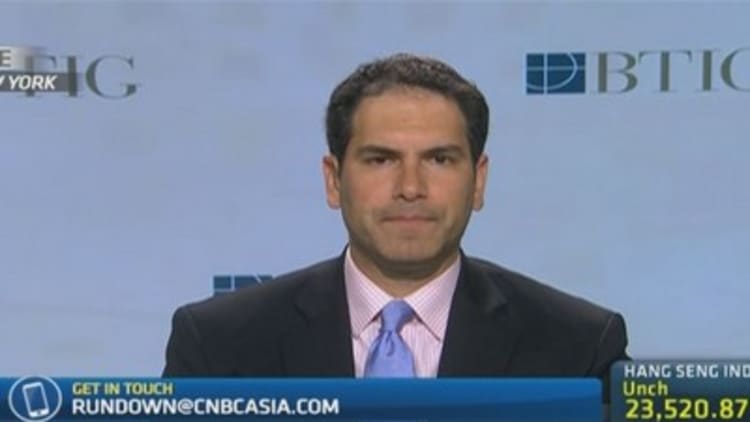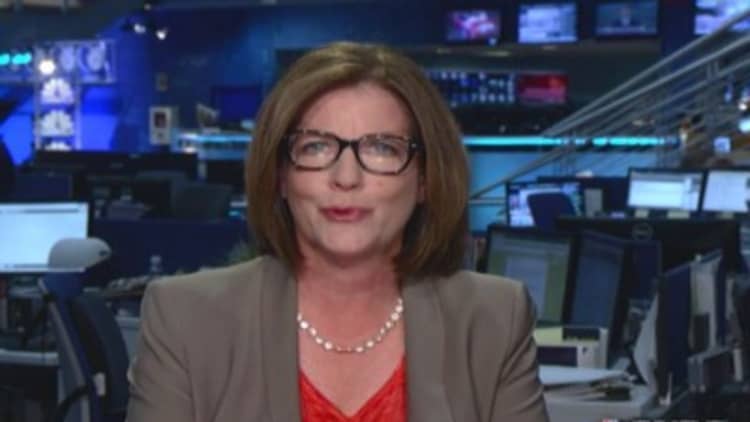The shooting down of a Malaysia Airlines jet over Ukraine and Israel's ground offensive in Gaza could lead to a bigger stock market pullback but the impact could be temporary unless there's further escalation.
Late-morning reports that Flight MH17 crashed in Ukraine near the Russian border with nearly 300 people aboard sent the Dow to double-digit losses. But late-afternoon reports of Israel's ground invasion of Gaza sent the Dow to triple-digit losses, and the S&P 500 finished the day with its first 1 percent loss since April 10.
Read MorePassenger plane shot down over Ukraine
The Malaysia Airlines Boeing 777 jet was en route to Kuala Lumpur from Amsterdam, when it was downed by a surface-to-air missile near Donetsk, a city controlled by Russian separatists. U.S. intelligence officials say it is unclear whether it was shot down by separatists or Russian forces, just across the border.
"The market these days is trained to know the initial reports are almost always wrong. Then they start parsing it," said John Canally, investment strategist at LPL Financial. "The market is wrestling with that issue—which is it? Was it shot down on purpose? Was it shot down by accident?"
Stock futures fell further just after the closing bell when U.S. Vice President Joseph Biden answered that question. He said the jet was shot down, "not an accident, blown out of the sky."

Analysts say as long as neither event escalates, the market should look past them within a few days. But the VIX, or the CBOE's volatility index, soared 32 percent Thursday, to 14.54, indicating the market expects more volatile trading in the near term.
"I think it would be nothing for the market to trade down 5 percent. That's almost like noise," said Scott Wren, senior equity strategist at Wells Fargo Advisors. "With the run we've had people are quick to take a little money off the table and wait to see what happens ... the fundamentals to me still look decent and I don't think these two events have a large probability of turning into something that's going to disrupt the global oil supply or cause Russia to do something like cut the gas supply into Europe."
"I personally think Europe and the U.S. will do the sanctions route but they're not going to do any more than that," he said.
Read MoreIsrael launches ground offensive in Gaza
Peter Boockvar, chief market analyst with Lindsey Group, said the ground invasion in Gaza could be a short-term negative but barring an escalation of fighting, it too should have just a temporary impact.
"I think every geopolitical situation that we've seen has had a fleeting impact on the market," he said. "I don't think people should turn bearish because of this. It scares people for a short period of time, and that's it."
Wren said the situation in the Middle East is ongoing and the market could take it in stride. "I'm still thinking this is not going to turn into a gigantic ordeal at least in the near term. Clearly what's going on in the Middle East is nothing new, nothing that's going to stop anytime soon and the cease-fires only last for so long."
The Dow fell 0.9 percent, or 161 points, to 16,976, and the S&P 500 lost 1.2 percent to 1,958. The led the declines with a 1.6 percent loss to 1,133, and the was down 1.4 percent to 4,363.
Read MorePutin blames Malaysian air crash on Ukraine
Scott Redler, who follows the market's short-term technicals at T3Live.com, said these events may be catalysts for a short-term correction. He said the next target technicians are watching on the S&P 500 is 1,952.
"If we close below that Friday, with the headlines and repercussions of what happened today, we could see something that could be more sustained to the downside. The area beneath that is 1,925." He said the S&P could take aim at 1,925 next week.
"It's feasible that we at least see 1,925 and a retest of 1,902," Redler said. That was the level that triggered the S&P's multimonth run. "This could be a bigger reason for people to take profits and shorts to get more aggressive," he said, noting the Russell 2000 and the biotechs have been weakening for the past two weeks.
The Treasury market responded with a flight-to-safety bid. The yield on the 10-year was at 2.45 percent in late-afternoon trading, off from its earlier high over 2.50 percent earlier in the day.

"Without today, you would have seen yields moving ... higher," said Dennis Gartman, publisher of The Gartman Letter. He said traders would have been discussing when the Fed would move to hike interest rates. "But this circumstance today trumps that; it takes all of those other concerns off. This is the only thing the market is going to focus on for the next 48 hours."
Traders say once more facts surrounding the downing of the aircraft come out, the markets should go back to focusing on the Fed, the economy and earnings if there is no escalation of the situation between Russia and the Ukraine. One concern was a report that Russian President Vladimir Putin blamed Ukraine for shooting down the jet.
"The economy is clearly accelerating. At the end of the day, what's going to drive stocks is earnings and economic growth," Canally said. "What weighs against this is in a year, you typically get four 5 percent pullbacks. So we had one this year. Last year we had only one or two and we haven't had a 10 percent correction since 2011. You usually get one a year. But I think this will get bought rather than sold."
Read MoreMalaysia launching immediate investigation into crash
Canally said markets will be watching to see if the Malaysia Airlines downing intensifies the standoff between Russia and the West over Ukraine. The U.S. on Wednesday announced a new round of sanctions against Russia.
"As these details get sorted out, the markets need to decide if this is enough of an escalation of the conflict that's been going on to warrant a pullback," Canally said. "Does it truly impact global growth and the earnings of U.S. companies? That tells you if it's more than a couple-day blip, 5 percent, 10 percent."
Canally said the sectors that typically get bought during times of uncertainty are the safe haven utilities, telecom and health-care sectors.
There were dramatic reactions in other markets. Wheat futures initially jumped more than 3 percent, and corn was slightly higher on speculation that any disruption in exports from Ukraine or Russia could result in more demand for U.S. crops.
Read MoreWhy market bears may need a summer hibernation
Gold futures, under selling pressure this week, were up 1.3 percent, or $17, at $1,316.90 per troy ounce. Silver, moving with gold, was up about 2 percent. The yen gained further ground against other currencies, as the dollar slid with Treasury yields.
Gold futures broke above the 100-day moving average of $1,304, which it had fallen through earlier this week before finding support at the 50-day, about $1,293.
"These events are very fast moving. If it I doesn't escalate further, we could conceivably see prices fall back down. It's been pretty much thin in the market, given the summer conditions. A lot of technical movements," said Howard Wen, precious metals analyst at HSBC.
Oil, already higher on the day, gained further. West Texas Intermediate was up 2 percent at $103.10 per barrel. Brent was up 0.6 percent to $107.80 per barrel.
Wheat futures closed up 2.4 percent at $5.50 per bushel.
Read More Obama warns Putin of more sanctions over Ukraine
"After the report started hitting the wires, we saw a lot of short covering coming in. There was a lot of knee-jerk reaction to the report," said Shawn McCambridge, commodities analyst with Jefferies Bache.
Ukraine and Russia are both major wheat producers, and ship lower-priced wheat and corn. "If it were to be affected or even a deterrent to end-users awaiting shipments of wheat or corn that could shift business to the U.S."
Winter wheat is currently being shipped, he said, adding that the USDA puts combined projected wheat production from Russia and Ukraine at 19 percent of the world's total. Ukraine's wheat crop is projected at 9 million tons and Russia at 19.5 million tons.
"They have been very aggressive in the market and captured much of their recent business," McCambridge said. "Depending on what happens in the next couple of days, it could certainly change the market dynamics and world trade."
Wren said the reaction in stocks was natural, and he has been saying the biggest risk to stocks this summer is event risk, not the U.S. economy.
"The markets need clarity on just what happened," he noted. "Uncertainly over an event (cause, etc.) usually results in markets trading down ... traders taking a little money off the table and waiting to see what happened."
—By CNBC's Patti Domm


